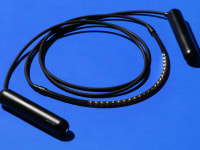Dehydration symptoms are easy to ignore—here’s when to see a doctor
Step 1: Obey your body’s thirst signals.
Products are chosen independently by our editors. Purchases made through our links may earn us a commission.
Staying properly hydrated is essential for survival: Water allows our cells to transport vital nutrients like carbohydrates and protein into our bloodstream and helps our bodies dissolve nutrients, minerals, and chemicals via natural biological processes. It also keeps our skin looking radiant and plump. (Fun fact: Many people confuse dry skin with dehydrated skin.) And though brands like Perrier and Poland Spring helped make buying bottled water ubiquitous, there’s scant science to support the commodifying of designer water nor trendy electrolyte-packed sports drinks.
That said, you still need to drink an adequate amount of H2O. But how do you know if you’re experiencing dehydration? Here’s what experts say about how frequently—and in what quantity—you really need to drink water.
What is dehydration, and how does it affect your body?
Dehydration occurs when your body loses more water than you take in from drinking fluids or eating water-rich foods. It’s good that we have a variety of sources of it, because the amount of water we consume plays a key role in helping us stay healthy. A full 60% of the adult human body is water, with the brain and heart containing 73% water and the lungs, 83%.
In addition to ensuring your body’s most important organs are healthy and hydrated, drinking water is essential for tissue and joint lubrication, enabling body temperature management via sweating, and keeping your energy levels up and your metabolism humming along.
It also plays a key role in digestion. Your body absorbs water via the digestive tract from the foods you eat and the beverages you drink. Not getting enough can lead to constipation—the uncomfortable, sometimes painful condition that occurs when your large intestine is unable to extract water content from the food you consume and you’re unable to pass waste. When this happens, your body is robbed of nutrients, and your organs can’t function at their peak. Dehydration can lead to painful kidney stones, or hard deposits of crystallized mineral salts that can form in any part of your urinary tract.
So how do you know if you’re approaching a risky situation? “The most common symptom of dehydration is lightheadedness, especially when changing position from lying down to sitting or standing,” says Dr. Yul Ejnes, clinical professor of Brown University's Alpert School of Medicine. “That means that the volume in the circulatory system is down, resulting in low blood pressure. Lethargy and confusion would be more serious signs.”
But there are indications that you need water before anything catastrophic happens, the most obvious one being the feeling of thirst. “When your body tells you that you need water through the thirst signal, it is sensing that your body fluids are getting concentrated,” Ejnes says.
How much water does your body need?
Though the old adage is to drink eight glasses of water a day, the amount you personally need can depend on many factors, including your weight, activity level, overall health, and sex. Some people experience an above-average loss of fluids from health conditions such as diabetes.
In addition, participating in high-intensity endurance exercise or living in hot climates can increase your risk. Dry mouth, dark-colored urine, headaches, fatigue, brain fog, muscle cramping, and dry skin are all signs of mild to moderate dehydration. But it’s best not to wait that long to take your next sip: By the time your body even indicates you’re thirsty, you may already be dehydrated. “In situations where there is above-normal loss of fluids, it’s best not to wait for your thirst to kick in,” says Dr. Ejnes. “Instead, try to stay ahead of the fluid loss.”
To stay healthily hydrated, look at your drinking and eating habits. Beverages that replenish include regular old water (the best option), as well as soft drinks, juices, teas, and even coffee; for foods, the liquid in soups and water-rich fruits and veggies like watermelon, strawberries, and leafy greens also counts. And while there’s probably no harm in doctoring up your water with electrolyte powders, these don’t provide any advantage for routine water needs (though if adding some flavor to boring water encourages you to sip more, have at it).
What doesn’t count toward your fluid intake: adult beverages. Alcohol is a diuretic, which means it pulls water out of your cells so you’ll urinate out more fluid than you consume with that beer, wine, or mixed drink.
How can you prevent dehydration?
One of the easiest ways to make sure you’re sipping enough is to keep a reusable bottle handy. The best water bottle we’ve tested is the Brita BB11 Premium Filtering Water Bottle, which is insulated to keep your sips chilled and includes a filter to sift out impurities that can affect taste.
If that’s not enough to prompt you to drink regularly, a smart water bottle, such as the Hidrate Spark 2.0, tracks your intake and delivers detailed recommendations that adjust based on the weather, your average sipping habits, and your activity level.
And while oral hydration is the most accessible way to ensure you’re getting enough water, in some specific cases, like for hardcore endurance athletes, an IV infusion could be warranted. Though it’s not as pleasurable as sipping your fluids, this method can be a lifesaver for rapid rehydration after or during a big race. This is especially true during hot weather when they fall behind on their water intake, resulting in low blood pressure or electrolyte imbalances, says Ejnes.
Is it possible to over-hydrate?
That said, you don’t want to get overzealous, particularly if you haven’t really noticed any signs that your water intake is lacking. Taking in too much of a good thing can lead to water intoxication (yup, that’s a thing), also known as hyponatremia, when salt and electrolyte levels in the body become diluted and therefore too low.
And while usually your kidneys process excess water, certain medications such as nonsteroidal anti-inflammatory drugs (NSAIDs) used to treat minor aches and pains as well as medications for high blood pressure called antihypertensives can cause your body to retain it. This makes it difficult to know if your clear urine is a sign of health or a more serious condition. If you fall into this category, ask your doctor how you should regulate how much you drink.
Lastly, if you often feel excessively thirsty despite consuming enough water, see your doctor to determine if you might have an underlying condition such as type 2 diabetes or kidney disease.
The product experts at Reviewed have all your shopping needs covered. Follow Reviewed on Facebook, Twitter, Instagram, TikTok, or Flipboard for the latest deals, product reviews, and more.
Prices were accurate at the time this article was published but may change over time.


